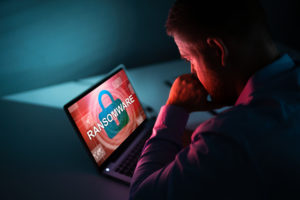How to Avoid a Ransomware Attack
Filed under: IT Support
 You probably heard about the ransomware attack on the Colonial Pipeline a few weeks ago, but did you know that ransomware attacks more than doubled in 2020? It seems as though certain unscrupulous individuals took advantage of the disruptions caused by the pandemic, and increased their efforts at distributing ransomware to unsuspecting workers.
You probably heard about the ransomware attack on the Colonial Pipeline a few weeks ago, but did you know that ransomware attacks more than doubled in 2020? It seems as though certain unscrupulous individuals took advantage of the disruptions caused by the pandemic, and increased their efforts at distributing ransomware to unsuspecting workers.
However, it might surprise you to learn that these attacks are far more likely to occur with a small business than they are with a larger conglomerate. The reason? Small businesses are typically easier targets, as most have minimal security measures in place.
Here’s what you need to know to protect your business against ransomware and data loss.
First, what is a ransomware attack? Ransomware is a particularly malicious type of malware, which can infect your system via the usual routes used by other malware programs. However, a ransomware attack is focused on a payoff, rather than simply stealing your data. The program locks your data so that you can’t access it, and then attackers demand a ransom in exchange for return of access. Last year, the average demand amounted to $170,000.
Ransomware protection. Luckily, the protections against ransomware are similar to other malware prevention strategies. Remember that only one wrong move by one employee can allow ransomware into your computer systems, so make sure your entire team is trained in the following protective measures:
- Never click on unverified links on websites or within emails. A download of malware can start instantly within one click.
- Don’t open email attachments without first verifying the sender. Does this person have a reason to send you an attachment?
- Only surf verified safe websites. Look for the lock symbol and/or “https” in the website’s URL. Unsafe websites are much more likely to offer malicious links.
- Only download apps from secure app stores, like Google Play or iphone’s App Store.
- Don’t give out personal information over the phone or email. Hackers often seek certain information first, and then launch a ransomware attack.
- Use an email service that offers scanning and filtering for emails.
- Don’t use unfamiliar USB devices on company computers.
- Always install all software and operating system updates when prompted.
- If using public WiFi for any reason, use a VPN to protect information sent over the network.
- Install a good security software on all devices, and keep it updated.
- Back up all data according to your company’s needs.
In the event a ransomware attack occurs, never pay the ransom. There is no guarantee that your data will even be returned, as promised. Call Davik Consulting at 888-RING-MY-TECH to discuss ransomware protection in more detail. It’s much easier for you to fight ransomware BEFORE it attacks!











